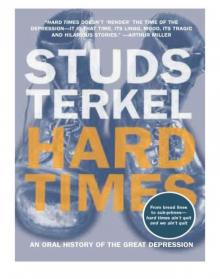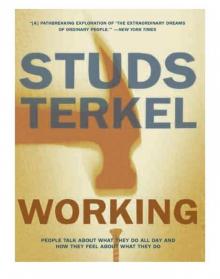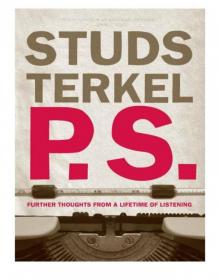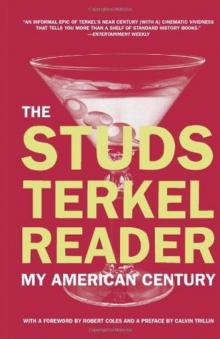- Home
- Studs Terkel
Hard Times
Hard Times Read online
Table of Contents
OTHER BOOKS BY STUDS TERKEL
Title Page
Dedication
Acknowledgments
Foreword
NOTE
A Personal Memoir
BOOK ONE
The March
Jim Sheridan
A. Everette McIntyre
Edward C. Schalk
The Song
E. Y. (Yip) Harburg
Sgt. Pepper’s Lonely Hearts Club Band
Lily, Roy and Bucky
Diane
Andy, 19
Michael, 19
Tad, 20
Nancy, 21
Marshall and Steve
Hard Travelin’
Ed Paulsen
Pauline Kael
Frank Czerwonka
Kitty McCulloch
Dawn, Kitty’s Daughter
Louis Banks
Emma Tiller
Peggy Terry and Her Mother, Mary Owsley
Kiko Konagamitsu
Country Joe McDonald
Cesar Chavez
Fran
Blackie Gold
The Big Money
William Benton
Arthur A. Robertson
Jimmy McPartland
Sidney J. Weinberg
Martin DeVries
John Hersch
Anna Ramsey
Dr. David J. Rossman
Man and Boy
Alonso Mosely, 20
Clifford Burke, 68
God Bless’ the Child
Jane Yoder
Tom Yoder, Jane’s Son
Daisy Singer
Robin Langston
Dynamite Garland
Slim Collier
Dorothe Bernstein
Dawn, Kitty McCulloch’s Daughter
Phyllis Lorimer
Bob Leary
Bonnie Laboring Boy
Larry Van Dusen
Jose Yglesias
Evelyn Finn
Hank Oettinger
E. D. Nixon
Joe Morrison
Mary, 22
Gordon Baxter
Three Strikers
Bob Stinson
Gregory
Charles Stewart Mott
Scott Farwell
Mike Widman
Howard
Dr. Lewis Andreas
BOOK TWO
Old Families
Edward A. Ryerson
Diana Morgan
Mrs. Winston Roberts
Noni Saarinen, Mrs. Roberts’ Maid
Julia Walther
Member of the Chorus
Win Stracke
High Life
Sally Rand
Tony Soma
Alec Wilder
Carl Stockholm
Doc Graham
Jerome Zerbe
Judy
At the Clinic
Dr. Nathan Ackerman
Sixteen Ton
Buddy Blankenship
Mary Owsley
Aaron Barkham
Edward Santander
Roger
The Farmer Is the Man
Harry Terrell
Oscar Heline
Frank and Rome Hentges
Orrin Kelly
Emil Loriks
Ruth Loriks, His Wife
Clyde T. Ellis
Emma Tiller
Sumio Nichi
Editor and Publisher
Fred Sweet
W. D. (Don) Maxwell
Carey McWilliams
BOOK THREE
Concerning the New Deal
Gardiner C. Means
Raymond Moley
C. B. (Beanie) Baldwin
James A. Farley
Joe Marcus
Burton K. Wheeler
David Kennedy
John Beecher
An Unreconstructed Populist
Congressman C. Wright Patman
Peroration
Colonel Hamilton Fish
Scarlet Banners and Novenas
William L. Patterson
Max Shachtman
Dorothy Day
Fred Thompson
Saul Alinsky
The Doctor, Huey and Mr. Smith
George Murray
Senator Russell Long
Evelyn Finn
Gerald L. K. Smith
The Circuit Rider
Claude Williams
The Gentleman from Kansas
Alf M. Landon
A View of the Wood
Christopher Lasch
Robert A. Baird
Tom, His Younger Son
Peter, His Older Son
Campus Life
Pauline Kael
Robert Gard
Chance Stoner
BOOK FOUR
Merely Passing Through
Edward Burgess
Billy Green
Scoop Lankford
Three o‘Clock in the Morning
Wilbur Kane
A Cable
Myrna Loy
BOOK FIVE
The Fine and Lively Arts
Hiram (Chub) Sherman
Neil Schaffner
Paul Draper
Robert Gwathmey
Knud Andersen
Little Brother Montgomery and Red Saunders
Jack Kirkland
Herman Shumlin
Public Servant—The City
Elizabeth Wood
Mick Shufro
Elsa Ponselle
Sergeant Vincent Murray
Earl B. Dickerson
Dr. Martin Bickham
Evictions, Arrests and Other Running Sores
Mrs. Willye Jeffries
Harry Hartman
Max R. Naiman
Judge Samuel A. Heller
A Young Man From Detroit and Two Girl Companions
Honor and Humiliation
Eileen Barth
Ward James
Ben Isaacs
Howard Worthington
Stanley Kell
Horace Cayton
W. L. Gleason
Strive and Succeed
Harry Norgard
General Robert E. Wood
A. A. Fraser
Tom Sutton
Emma Tiller
W. Clement Stone
Ray Wax
Epilogue
Copyright Page
OTHER BOOKS BY STUDS TERKEL
American Dreams
Lost and Found
Division Street
America
Giants of Jazz
“The Good War”
An Oral History of World War II
Hope Dies Last
Keeping the Faith in Troubled Times
My American Century
Race
How Blacks and Whites Think and Feel
About the American Obsession
The Spectator
Talk About Movies and Plays
with the People Who Make Them
Talking to Myself
A Memoir of My Times
Will the Circle Be Unbroken?
Reflections on Death, Rebirth, and Hunger for a Faith
Working
People Talk About What They Do All Day and
How They Feel About What They Do
For my wife, my son, and my editor
ACKNOWLEDGMENTS
FRIENDS, acquaintances and, in astonishing number, strangers were gracious in offering suggestions. Without their hunches and tips, this work may not have been possible. Among these casual scouts: Richard Lamparski, Robert Cromie, Herman Kogan, Mike Royko, Lew Frank, Jr., Lucy Fairbank, Robert Sherrill, Phyllis Jackson, James Patton, Clifford and Virginia Durr, John Dierkes, Lou Gilbert, Phil McMartin, Sanka Bristow, Harry Boura
s, King Solomon, Brendan McMahon, Earl Doty, Lou Abraham, Elizabeth Cooper, Jesse Prosten and Leon Beverly.
As in a previous work, Division Street: America, it was Cathy Zmuda, who did more than transcribe the hundreds of thousands of spoken words onto pages. She offered gratuitous editorial comments and thus provided me with a perspective that might otherwise have been missing.
My colleagues at radio station WFMT, notably Norm Pellegrini, Ray Nordstrand and Lois Baum, were remarkably understanding and ingenious during my leaves of absence. My daily programs, re-broadcasts, had an air of contemporaneity, thanks to them. My gratitude, too, to Jim Unrath for beyond-the-call-of-duty chores as my companion and chauffeur, during a memorable trip through Arkansas.
Especially am I grateful to my editor, André Schiffrin, whose idea this was. His insistence and quiet encouragement are evident in all these pages. And to his perceptive associates, Verne Moberg and Linda Faulhaber, for their bright-eyed look at what was becoming burdensome matter—a salute.
Foreword
(January-February 1986)
Hard times come again no more …
As these words are being written, the Stephen Foster lyric rolls around in my head like a loose cannonball.
It is early in 1986, yet the Dirty Thirties come to mind. The bleak decade was so defined by a long-gone Congressman, whose remembrances you will find in these pages.
How come this foreboding reflection? The Six O’clock News and the financial sections of our most respected journals inform us, via Administration handouts, that things have seldom looked better. Even the phrase BOOM YEAR is occasionally headlined in a spirit of cheery prophecy.
True, there is the casual caveat, solemnly offered: something to do with “deficits.” But aside from the warnings of the usual Cassandras, it’s nothing to cause sleepless nights. It’s too arcane a word anyway, an accountant’s term. It’s nothing like “hunger” or “homeless.” These shadow words appear back in the feature pages, as “human interest” stories, adjacent to the gossip columns and theatrical news.
Up front are IMPORTANT developments. Look at the market. “Stocks jump another 12 … boosting the Dow-Jones industrial average to a record and proving that optimism over economic growth and corporate earnings remains high.”1 Look at Dow-Jones. Look at the corporate ads, offered with an air of Responsibility. Look at the bright and morning faces of Business Administration School graduates, attaché cases responsibly in hand, as they commute to the bustling office and the even more bustling Floor.
Unavoidably, you look at the face of the farmer as he is caught by the TV camera. You know the one: the desperate Iowan, who killed his neighbor and himself. I believe a minor bank official got it, too. It wasn’t his fault either. He was as distraught as the man who killed him. It was bigger than both of them.
Last month, in Union County, which has the richest land in South Dakota, a young Farmers Home Administration supervisor killed his wife, daughter, son and dog while they slept, then went down to his office and shot himself dead. He left a note: “The job has got pressure on my mind, pain on left side.” … Because he was an out-of-stater, the F.H.A. moved him about the state, apparently figuring he would be more willing to get tough with local farmers who were behind on their loan payments than would a native South Dakotan.2
Who do I shoot? cried out Muley Graves, Steinbeck’s near-crazed Okie, as he was being bulldozed off the land. God, I don’t know, replied the town’s bank officer, who was going sort of crazy himself.
Muley was a small farmer of the Thirties. The Iowan was a small farmer of the Eighties. Though a half-century separates them, their tether’s end was commonly caused: neither could meet the payments.
Never since the Great Depression has the family farmer experienced such hardship, such despair. Scores of thousands are, with a growing sullenness, sampling the grapes of wrath. If help is not forthcoming one way—say, from Big Guv’mint—they will seek another. It’s a natural for the nearest con artist at hand.
Kearney, Nebraska—Huddled under blankets last weekend in a cold, dark grain-storage shed, 200 men and women from around the Midwest listened intently to a tall man in a dark business suit pledge to take up arms in defense of dispossessed farmers. “Christ told us he didn’t come to bring peace but to bring us a sword,” said the boyishly handsome 32-year-old Larry Humphreys. “When the banking system collapses, the logical thing to do is to come out bearing arms… . It’s pretty much common knowledge that most of the international banks are Jewish… .”3
There was farm anger and militancy in the Thirties too, but with a difference. The Posse Comitatus and the Aryan Nation would have been hooted off the wheatlands as clownish and diversionary. There was some awareness of root causes, an awareness that has diminished considerably during a half-century of amnesia. The farmers of the Thirties drew a bead on Washington.
Emil Loriks of South Dakota remembers: “The situation was tense in ten or eleven states. You could almost smell the powder. When Governor Herring of Iowa called out the militia, Milo Reno4 said, ‘Hold off. I’ll not have the blood of innocent people on my hands.’ We had a heck of a time getting the farmers off Highway 75. There were probably a thousand of them out there. Reno called a meeting at Sioux City. About thirty thousand farmers showed up. We decided to go to Washington and settle for a farm program. If Roosevelt hadn’t come in in ‘32, we’d a’ been in real trouble.”
Then and Now. In the Thirties, an Administration recognized a need and lent a hand. Today, an Administration recognizes an image and lends a smile. Larry Humphreys recognizes a bitter fruit, ripe for the picking.
The latest communique from Chicago’s Far South Side informs us that the Southworks of U.S. Steel is laying off six thousand. That leaves a thousand on the job—for the time being. It had not been unexpected. The community had known it was coming: merely a few more thousand swelling the roster of idle hands in heavy industry.
Recently, Ed Sadlowski, a union officer, whose grandfather, father, and himself were steelworkers, drove me around the plant area. Like Leslie Howard, the dreamy hero of the film Berkeley Square, I was transported into another time. The Englishman found himself a subject of George IV. I found myself reliving the last days of Herbert Hoover’s Presidency.
Smokeless chimneys. No orange flashes in the sky. Empty parking lots. Not a Chevy or a Ford to be seen, not even for those with 20–20 vision. An occasional abandoned jalopy, yes, evoking another image of the Thirties. Ours was the only moving vehicle for miles around. A stray dog; no humans. And it wasn’t that cold a day. In fact, the weather was unseasonably mild, accentuating the landscape’s bleakness.
The business end of the neighborhood wasn’t all that busy either. A boarded-up store or two or three. Ed pointed at a men’s clothing store: Open For Business. “He’s closing next month.”
South Chicago has joined Youngstown, Johnstown, and Gary. Steel Town circa Eighties has become Ghost Town circa Thirties. Recently, at an art-film house, I saw Willard Van Dyke’s 1938 documentary, Valley Town. It was Lancaster, Pennsylvania, a steel city of the Great Depression, stone cold dead. It was an experience of déjà vu in reverse. I saw Ed Sadlowski’s South Chicago
Where to? What next? At the time Carl Sandburg raised those questions in his celebrated long poem, he was assuming a tribal remembrance, generations hence. He did not count on a generation’s amnesia. Would he have today renamed his work The People, Maybe?
As newspapers gather in my living room, in the manner of an old bum’s bundle, last week’s and the week’s before, I’m able to make out headlines about bullish markets. A stray item in the same week-old edition catches my eye. Dateline, Waterloo, Iowa: “Another 200 employees will be laid off at Deere and Co., bringing to more than 1,000 the number of workers idled at the plant since October.” Don Page of UAW Local 838 is quoted: “You keep saying it can’t get worse, but it does.”
It appears that Don Page and the President are on different wave lengths; certainly
not on the same planet. Today’s Murdoch headline positively glows: THE GREAT COMEBACK. Subheadline: U.S. Grows Stronger Every Day —Reagan. Though the Wall Street Journal and the New York Times are less flamboyant, they are equally euphoric.
Back to the bundle. Dateline, Schenectady, N.Y.: “At least 1,500 jobs will be eliminated this year at General Electric’s turbine division… .” In 1974, 29,000 were employed at the plant. By 1980, it was under 17,000.
As the comics page is turned—barely discernible, pentimento-esque, are the outlines of Bloom County—there’s a serious message from Eastern Airlines: 1,700 attendants will be fired and the pay of the survivors will be cut 20 percent. The Transport Workers Union explains elsewhere that it’s a 32 percent cut in real wages.
AT&T, as well, has an announcement. It does not appear in its TV messages. There is no need for actor Cliff Robertson here. Its Aurora plant roster will be cut from 4,000 to 1,500. As Kurt Vonnegut would say, So it goes.
Last week, near my building of work, a line of young people was snaking all around the block. At first I thought they were hopefuls awaiting Chicago Bears tickets. There was one such line a block away. This file was overwhelmingly black, about two hundred. One of these hopefuls, age nineteen, told me he and the others were job applicants. Later that day, an acquaintance in the personnel department let me know there were about five openings.
Ed Paulsen was nineteen in 1931. He was a job applicant, too. San Francisco. “I’d get up at five in the morning and head for the waterfront. Outside the Spreckels Sugar Refinery, outside the gates, there would be a thousand men. You know dang well there’s only three or four jobs. The guys would come out with two little Pinkerton cops: ‘I need two guys for the bull gang. Two guys to go into the hole.’ A thousand men would fight like a pack of Alaskan dogs to get through there. Only four of us would get through.”
Young Paulsen took to the road, along with millions of others. He rode the freights. Half the time, the boxcar, standing room only, was his home. Somewhere out there, in Kansas or Nebraska or who knows where, there might be a job of some sort.
A black World War Two vet, Louis Banks, shares the memory. “Black and white, it didn’t make any difference who you were, ‘cause everybody was poor. All friendly, sleep in a jungle. Sometimes we sent one hobo to walk, to see if there were any jobs open. He’d come back and say: Detroit, no jobs. He’d say: they’re hirin’ in New York City. Sometimes, fifteen, twenty guys were in that one boxcar. More. Women even, quite a few tryin’ to disguise themselves. Oh, everybody was ridin’, hopin’.”

 Will the Circle Be Unbroken?
Will the Circle Be Unbroken? Hard Times
Hard Times Working
Working Touch and Go
Touch and Go P.S.
P.S. The Studs Terkel Reader_My American Century
The Studs Terkel Reader_My American Century